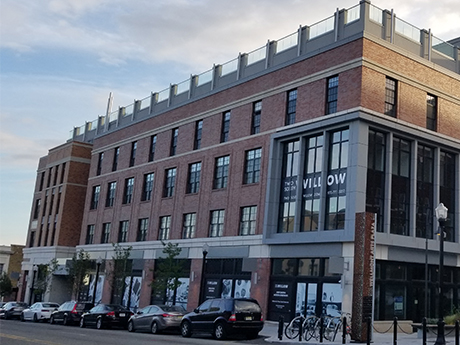Katz & Associates is providing leasing services for the redevelopment of Seymour Street, a mixed-use destination in the northern New Jersey community of Montclair. Ironstate Development and Brookfield Properties recently completed the project, which added 35,000 square feet of much-needed quality retail space to local supply.
By Brian Katz (CEO), Amy Staats (Vice President), Jonathan Greenberg (Director), Adam Caplan (Director) and Hugh Scullin (Vice President) of Katz & Associates
The Northern New Jersey commercial real estate market has thrived in the post-COVID-19 era. Inventory continues to decline across the board, with exceptional demand for drive-thru locations and mid-size boxes. Moreover, modern and well-established neighborhood and power centers rarely have more than one or two small vacant businesses.

Brian Katz, Katz and Associates
Some high-demand categories include discount clothing, groceries, food, health and beauty, fitness, and medical. Northern New Jersey benefits in particular from its critical mass and easy access to major highways and ports of entry. Tenants who have been able to refocus and adapt have thrived in a market that already has a lot to offer.
Simply put, the post-COVID rebound has been better than we could have imagined, and from a business perspective, the pipeline of deals underway or closed has been among the strongest in our history.
rental activity
Rental activity is on the rise. Market adjustments aside, rental activity is roughly back to pre-pandemic levels. In some cases, closing deals is even easier since tenants and landlords have had time to fine-tune their “non-negotiables” and cut through the many red tape that often clogged the pipeline and slowed the process.

Amy Staats, Katz & Associates
As for landlords, there is still a learning curve for some of the family operators who hoped the pandemic would offer reduced rents and landlords would help with their construction expenses. In reality, rents are equal to or, in some cases, higher than pre-pandemic rents, and landlords are less likely to contribute to tenant builds. However, some landlords are willing to get creative with tenant improvement (TI) allowances in order to get deals on the finish line.
Additionally, newly built mixed-use properties in the region’s secondary or tertiary retail corridors — particularly those without ample on-site parking — have been a little harder to rent. There are fewer retailers ready to roll the dice on these properties at the rent levels that landlords are asking for.
user profiles
Groceries, discount clothing, and home improvement dominate large spaces and juniors. In the small store, we have seen an increase in fitness, health, medical and wellness concepts, including dental, physiotherapy, dermatology, urgent care centers, cryotherapy and intravenous infusion therapy. Fast food restaurants have also made strong expansion spurts.

Jonathan Greenberg, Katz & Associates
The market for car uses and child care is also very strong at the moment. And with the legalization of recreational cannabis in New Jersey, brokers are receiving dozens of calls from potential users looking to open a dispensary. Fast food restaurants, urgent care centers and cannabis retailers are willing to pay rents at or above market for optimal sites in a commercial area. On the other hand, there are fewer clothing retailers actively seeking urban street-front spaces than before COVID.
Industry Morale
Overall, the mood of retail landlords and tenants is up now that it looks like the worst of the COVID era is behind us.
With relatively few new mall developments opening in the region since the start of the pandemic and positive net uptake for several consecutive quarters, landlords are willing to wait a little longer to find the right tenant and deal structure. .
Most tenants are optimistic, although supply chain, labor and inflation issues persist and influence the terms of the proposed deal. Both parties have to want to reach an agreement. Both sides of the equation are eager to negotiate but have less patience for protracted negotiations. It seems that deals are either closing at a faster rate or not closing at all.
Creativity is needed right now, and both parties seem to be relatively open to what the other has to offer. But success only comes when both parties can get along. Negotiations must be fair and equitable for both parties, and rising construction costs have and will continue to make this more difficult over time.
Main desires of the tenant and the owner
We see tenants focusing on base rent, along with upgrade packages, other allowances, and overall flexibility. Owners are looking for long-term commitments with guarantees.

Adam Caplan, Katz & Associates
Regional and local landlords are hesitant to offer generous IT packages to tenants with less than stellar finances or insist on terminating leases early if they don’t meet their sales forecasts. Large REITs continue to try to “buy out” rents in exchange for larger improvement programs.
Retail consumption
As the last of the Sears and Kmart stores close in the state, other area retailers have taken note of the missteps and have clearly taken drastic measures to improve their own experiences.
For example, discount grocer Lidl’s glass facades and sun-drenched prototype stores have proven popular among mid-market grocery shoppers and can enhance the aesthetics of malls and retail corridors. Improvements by quick-service restaurants in the length and configuration of drive-thru lanes are reducing order-to-pickup times.
Northern New Jersey consumers expect excellence in any given retail tenant mix, whether it’s the diverse and interesting independent retailers and restaurants that line Washington Street in Hoboken or the reliable big-box stores that have lined Route 22 in Union/Springfield for decades. Factors ranging from the ease of parking to the appearance of the center and the shops are good indicators of the quality of the operator.
Retail experience matters. Malls that have potholes all over the parking lot or trash that overflows into their receptacles or generally have an outdated feel have these issues articulated in LOI negotiations. If the landlord wants a market rent, the maintenance of the shopping center should help support it.
Development activity
We continue to see new development and new construction, but it’s fair to say that much of what’s in development has been in the works for several years.

Hugh Scullin, Katz & Associates
Rising construction costs, coupled with supply chain issues, are an integral part of the equation when negotiating deals today. Construction costs have skyrocketed and the amount of labor demanded far exceeds the supply of labor, making it difficult to complete projects in a timely manner.
Considered in conjunction with the backlog of projects, it seems clear that the market will be unbalanced in terms of new projects coming online. However, there is still a tremendous amount of mixed-use development in Opportunity Zones, particularly in parts of Jersey City, Hoboken, Hackensack and Newark. There are not many new outdoor mall developments in the area, although several older centers along the Route 440 corridor in Jersey City and Routes 4 and 17 in Paramus will undergo major redevelopments over the next two years.
Upcoming Predictions
Although there is uncertainty, the dramatic decline in national retailer and restaurant bankruptcies over the past two years, as well as the dramatic influx of residents in Bergen, Essex and Hudson counties, could boost commercial real estate in northern New Jersey. To that end, we expect trading to continue despite some of the economic headwinds that we may face in the coming months.
Rate hikes are going to play a major role in how consumers react to the market, and impending global shortages are going to impact purchases and how people allocate their money. Hopefully the economy can weather the rising costs of everything from food to construction, while allowing retailers and restaurants to grow.
The good news is that there are always retail categories that do well in an economic downturn, and forward-thinking brokers can take advantage of what the market brings. For example, the cannabis retail sector is one that will grow now that widespread store openings across the state are in full force.
By staying informed, working smart, nurturing relationships, and staying ahead of trends and opportunities, brokers can create value for clients and themselves, even in turbulent economic times.

